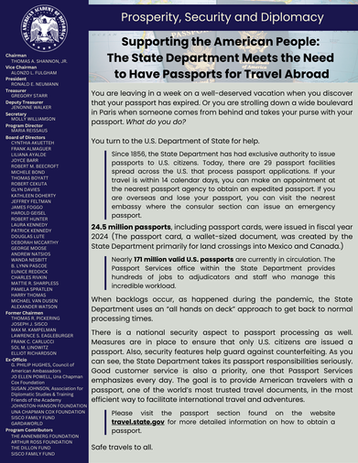The American Academy of Diplomacy and the Una Chapman Cox Foundation joined forces in 2015 to assess the future of Commercial Diplomacy (CD). With the encouragement and participation of the Commerce and State Departments, the authors interviewed more than seventy-five experienced corporate executives of globally active US companies and leaders of US trade and diplomatic agencies. Findings and recommendations for the two project reports, Support for American Jobs, Part I: Requirements for Next Generation Commercial Diplomacy Programs (May 2016) and Support for American Jobs, Part II: A New Government-Business Partnership for Commercial Diplomacy (June 2017), have been made available below.

Playing Offense to Expand American Exports and Win American Jobs Again
America needs to go on the offensive to keep the US as the world’s supplier and customer of choice for goods, services, ideas, capital and entrepreneurial energy.
That statement is as true today as when it was written thirteen years ago. Yet the global marketplace of 2017 has been fundamentally transformed, with serious threats to the US economy. Global competition grows more intense; rules are often broken. Competitor governments in Europe and Asia have upped their game, and their advocacy of national commercial interests have overtaken our own.
To redress these imbalances, the Trump administration is undertaking a major review of US economic, fiscal, regulatory, and trade policies. For trade, key priorities include: eliminating/reducing trade barriers, renegotiating Free Trade Agreements (FTA’s), a preference for bilateral over multilateral agreements, and tightened enforcement and compliance of existing agreements. These steps are key to America’s macro-economic competitiveness but they alone are not enough. We also need a comprehensive, aggressive national commercial diplomacy effort. Our major competitors have already taken this step; we need to out play them in putting business and government together overseas.
While US policy engagement will shape the future development of trade rules and economic policies, commercial diplomacy executed by a strong network of embassy officers on the front lines plus aggressive senior-level Washington advocacy will be a vital component of this effort to protect and expand the established US position as the world’s leading economy. Our existing commercial diplomacy programs and allocations of embassy resources have not evolved with the urgency that is required to address current market realities. We need to play aggressive offense, in today’s global business battles. And we need to win!
The American Academy of Diplomacy (AAD) and the Una Chapman Cox Foundation joined forces in 2015 to assess the future of Commercial Diplomacy (CD). With the encouragement and participation of the Commerce and State Departments, the authors interviewed more than seventy-five experienced corporate executives of globally active US companies and leaders of US trade and diplomatic agencies. Findings and recommendations for the two project reports, Support for American Jobs, Part I: Requirements for Next Generation Commercial Diplomacy Programs (May 2016) and Support for American Jobs, Part II: A New Government-Business Partnership for Commercial Diplomacy (June 2017), are attached below.






